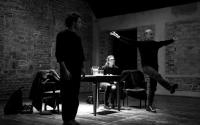4 April 2006Paras İndonesiaRenato Redentor Constantino
Have you asked yourself lately, for whom the bells toll? The prism of prison has more than four walls."No nation is exempt from the demands of human dignity," said US president George W. Bush. "Everybody desires to be free; embedded in the soul of each man and woman on the face of the Earth is this deep desire to live in liberty." Three decades from now, said the head of the star-spangled country, "people are going to look back at this moment and say, thank goodness a generation of Americans stood up and said, we have faith in democracy."1Easy to stand up; a little harder to be free.Today, America has more people locked up compared to any other country in the world -- half a million more than China, in fact, which has a population five times greater than the US. "No other society in human history," said the American organization California Prison Focus, "has imprisoned so many of its own citizens."2 Studies "reveal that the United States holds 25 percent of the world's prison population but only five percent of the world's people."3How do we free thee? Let us count the ways. In 1972, there were 300,000 inmates in America. By the year 2000, the number had risen to two million. A decade ago, "there were only five private prisons in the country with a population of 2,000 inmates." Today, the five have become 100, with 62,000 prisoners.4The war against freedom is good business: in the US, "the prison industry complex is one of the fastest growing industries." It has "its own trade exhibitions, conventions, websites and mail-order and internet catalogs. It also has advertising campaigns, architecture companies, construction companies and investment houses in Wall Street." It has plumbing supply firms and food supply enterprises and "padded cells in a wide variety of colors."Imperial synergy at its best: America's federal prison industry "produces 100 percent of all military helmets, ammunition belts, bullet-proof vests, ID tags, shirts, pants, tents, bags and canteens. Along with war supplies, prison workers supply 98 percent of the entire market for equipment assembly services; 93 percent of paints and paintbrushes; 92 percent of stove assembly; 46 percent of body armor; 36 percent of home appliances; 30 percent of headphones, microphones and speakers; and 21 percent of office furniture."5Define delusion: a penal complex?"The victory of the centrist sensibility marks the end of Israel's extravagant dreams," wrote Yossie Klein Halevi in the Los Angeles Times on March 29.6 The state created to shelter a people fleeing from genocide is now helmed by the Kadima Party and its main representative, Ehud Olmert, who celebrated his party's victory with crowds chanting "Ehud! King of Israel" and gigantic pictures of Ariel Sharon, a comatose war criminal, serving as his backdrop.7The Kadima Party and Olmert, who aims to annex "more than half of the West Bank," now represents the 'center' in a country continuously riven by violence and driven by the brawn of agendas premised on Palestinian dispossession.8 None of the major parties that participated in Israel's elections mentioned the word 'peace' during the electoral campaign. But no need to be alarmed, wrote Halevi, a senior fellow of the Shalem Center in Jerusalem; far from it: peace is an extravagance that Israel has evicted -- it is "a sign of the country's maturation."9Who else is 'mature'? Not a Filipino called Julius Mariveles, the news director of Aksyon Radyo-Bacolod, which broadcasts from the province of Negros Occidental. For his commitment to his calling, Mariveles has been openly targeted by the military as an enemy of the state.10 A small band of unrepentant 'juvenile' journalists dedicated to their mission and craft have protested the threatened liquidation of Mariveles. Aside from them, too many have preferred the comforts of silence.Today in the Philippines, "never again" has become "we have to move on." Because, really now, who cares? Journalists have become such a noisy, disruptive lot. I heard some of them are even on the take. Maybe Mariveles brought it upon himself. Maybe Mariveles is really a Leftist. I'm not even from Negros. I'm not a journalist. I don't like bearers of bad news. One night, not too long ago, with similar excuses in tow, a people happily walked into the prison of illusions. The next morning they woke up captives of the dictator named Marcos."It is possible," wrote the novelist Barbara Kingsolver, "to move away from a vast unbearable pain by delving into it deeper and deeper." It is much like "diving into a wreck" the writer tells us, borrowing the words of Adrienne Rich. "You can look at all the parts of a terrible thing," wrote Kingsolver as she described the process of grief, "until you see that they're assemblies of smaller parts, all of which you can name, and some of which you can heal or alter, and finally the terror that seemed unbearable becomes manageable."11But what of the sorrows that refuse to be named? What of the ruins that have increasingly come to define us?Notes:
"President Bush discusses democracy with Freedom House," Freedom House press release, 20 March 2006.Vicky Pelaez, "U.S. prison industry: big business or a new form of slavery?" San Francisco Bayview, 8 March 2006. The story was originally published in El Diario-La Prensa, New York. Ibid. Ibid. Ibid. Yossi Klein Halevi, "Israel's politics of dreams," Los Angeles Times, 29 March 2006."Olmert celebrates victory," News24.com-South Africa, 29 March 2006. Uri Avnery, "Four-letter word," The Palestine Chronicle, 14 March 2006. Ibid. 6. "We will defend our rights," Article 3 Alliance press statement, 31 March 2006. The Article 3 alliance counts the Negros Press Club, Congress of Active Media Practitioners, COBRA-ANS, Media Advocates for Reproductive Health and Empowerment, Negros Media Council for Press Freedom and more than a hundred individual journalists Barbara Kingsolver, Small Wonder (HarperCollins Publishers, 2002)





